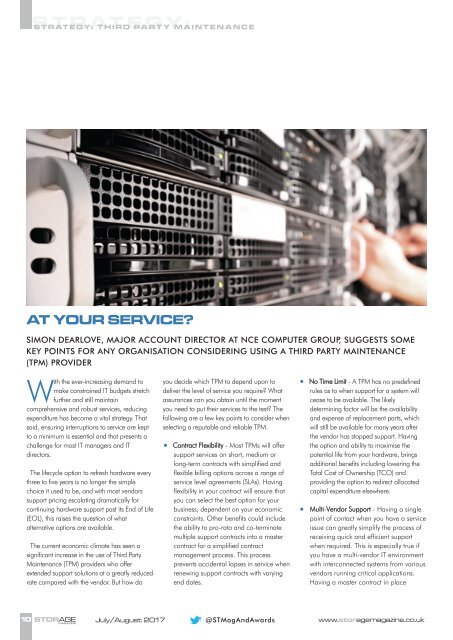ST1707
Create successful ePaper yourself
Turn your PDF publications into a flip-book with our unique Google optimized e-Paper software.
STRATEGY:<br />
STRATEGY: THIRD PARTY MAINTENANCE<br />
AT YOUR SERVICE?<br />
SIMON DEARLOVE, MAJOR ACCOUNT DIRECTOR AT NCE COMPUTER GROUP, SUGGESTS SOME<br />
KEY POINTS FOR ANY ORGANISATION CONSIDERING USING A THIRD PARTY MAINTENANCE<br />
(TPM) PROVIDER<br />
With the ever-increasing demand to<br />
make constrained IT budgets stretch<br />
further and still maintain<br />
comprehensive and robust services, reducing<br />
expenditure has become a vital strategy. That<br />
said, ensuring interruptions to service are kept<br />
to a minimum is essential and that presents a<br />
challenge for most IT managers and IT<br />
directors.<br />
The lifecycle option to refresh hardware every<br />
three to five years is no longer the simple<br />
choice it used to be, and with most vendors<br />
support pricing escalating dramatically for<br />
continuing hardware support past its End of Life<br />
(EOL), this raises the question of what<br />
alternative options are available.<br />
The current economic climate has seen a<br />
significant increase in the use of Third Party<br />
Maintenance (TPM) providers who offer<br />
extended support solutions at a greatly reduced<br />
rate compared with the vendor. But how do<br />
you decide which TPM to depend upon to<br />
deliver the level of service you require? What<br />
assurances can you obtain until the moment<br />
you need to put their services to the test? The<br />
following are a few key points to consider when<br />
selecting a reputable and reliable TPM.<br />
Contract Flexibility - Most TPMs will offer<br />
support services on short, medium or<br />
long-term contracts with simplified and<br />
flexible billing options across a range of<br />
service level agreements (SLAs). Having<br />
flexibility in your contract will ensure that<br />
you can select the best option for your<br />
business, dependent on your economic<br />
constraints. Other benefits could include<br />
the ability to pro-rata and co-terminate<br />
multiple support contracts into a master<br />
contract for a simplified contract<br />
management process. This process<br />
prevents accidental lapses in service when<br />
renewing support contracts with varying<br />
end dates.<br />
No Time Limit - A TPM has no predefined<br />
rules as to when support for a system will<br />
cease to be available. The likely<br />
determining factor will be the availability<br />
and expense of replacement parts, which<br />
will still be available for many years after<br />
the vendor has stopped support. Having<br />
the option and ability to maximise the<br />
potential life from your hardware, brings<br />
additional benefits including lowering the<br />
Total Cost of Ownership (TCO) and<br />
providing the option to redirect allocated<br />
capital expenditure elsewhere.<br />
Multi-Vendor Support - Having a single<br />
point of contact when you have a service<br />
issue can greatly simplify the process of<br />
receiving quick and efficient support<br />
when required. This is especially true if<br />
you have a multi-vendor IT environment<br />
with interconnected systems from various<br />
vendors running critical applications.<br />
Having a master contract in place<br />
^<br />
10 STORAGE July/August 2017<br />
@STMagAndAwards<br />
www.storagemagazine.co.uk<br />
MAGAZINE

















